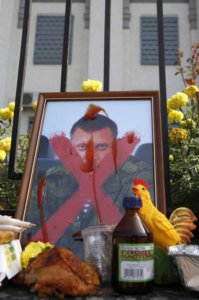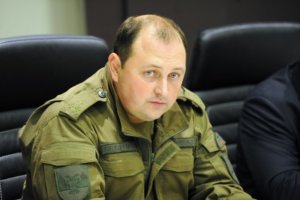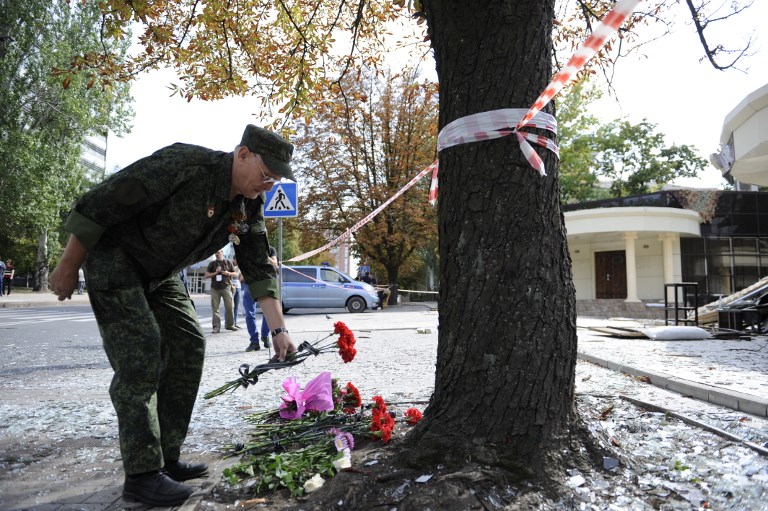Oleksandr Zakharchenko’s four-year reign as the leader of the Russian-occupied part of Ukraine’s Donetsk Oblast came to a violent end on Aug. 31, when he was assassinated by a bomb planted in a café in the center of Donetsk.
His killing was the latest in a half-dozen assassination of warlords and collaborators in the Russian-occupied parts of Donetsk and Luhansk oblasts – and it probably won’t be the last, observers say.
Indeed, Zakharchenko’s killing may have big implications for the war-torn region and the whole of Ukraine: many experts fear it may be used as an excuse by the Kremlin and Russian-led forces to escalate the fighting in the four-year-long war in the east.
It may also put in question the Minsk peace agreements inked in September 2014 and February 2015, of which Zakharchenko was one of two signatories for the Russian-led forces in the Donbas. The other, Igor Plotnisky, the former leader in Luhansk, was ousted in a “coup” nearly a year ago.
And while there is no clear evidence of who might have masterminded Zakharchenko’s killing – Russia, Ukraine, or rivals for power among Russia’s proxy forces – experts agree that the assassination was carried out very professionally.
Attack
Zakharchenko, 42, who was nicknamed Batya (informal for “Dad” in Russian), was killed along with his bodyguard in a Donetsk cafe called Separ (short for separatist). He had gone there to mourn Russian singer and Donbas native Iosif Kobzon, who died on the previous day.
Russian media wrote that an explosive device was hidden in a chandelier or a table lamp. Another of Zakharchenko’s bodyguards disappeared after the explosion and he is now being searched for by Russian-led forces as one of the main suspects in the killing, according to Interfax.
Zakharchenko’s right-hand man, the so-called “tax minister” of the Russian-occupied part of Donetsk Oblast, Aleksey Timofeyev, was wounded in the blast along with eight other people. Timofeyev attended Zakharchenko’s funeral on Sept. 2 with a bandaged head and a swollen, burned face.
A number of other odious pro-Kremlin characters were present at the funeral, including the head of Russian-occupied Crimea Sergey Aksenov, who was nicknamed “the Goblin” when he was the member of a criminal gang in Crimea, the Russian lawmaker and former prosecutor of Russian-occupied Crimea Natalia Poklonskaya, an ardent Russian monarchist who is wanted for treason in Ukraine, the famous pro-Kremlin biker Alexander “the Surgeon” Zaldostanov, a homophobic Stalinist, and Anatoliy Bibilov, the head of South Ossetia, a Russian-occupied region of Georgia, who supports uniting his unrecognized country with Russia.
Though the pro-Kremlin media showed thousands of people coming to the funeral, the Ukrainian website Novosti Donbasa revealed these were mostly not locals: the website published photos of the dozens of buses that had brought people to Donetsk to create the impression that large numbers of people in the city were in mourning.
Threats
After the pompous funeral, Zakharchenko was buried on Sept. 2 near the graves of other Donbas warlords Arseniy Pavlov, better known as “Motorola,” and Mikhail Tolstykh, known as “Givi” who were killed in blasts in 2016 and 2017.
But Zakharchenko’s death was the first one to prompt an official comment from Russian President Vladimir Putin, who in a statement on his website said that those who had committed the murder “were making a dangerous wager on destabilization.”
Denis Pushylin, the head of the so-called “people’s council” of the Russian proxy authorities in Donetsk, said that “Donetsk will avenge this crime.”
And without producing any evidence, both Russia and its proxy forces in the Donbas immediately blamed Kyiv for Zakharchenko’s death.
Oleksiy Matsuka, a Donetsk journalist who had to flee the city due to the war, told the Kyiv Post that such talk of revenge may be a dangerous signal that there might be attempts to spread the violence in the Donbas to other parts of Ukraine.
“The question is who they will say is guilty of this,” he said. “And if they say someone from Ukrainian side is guilty, will it bring terror attacks to Kyiv?”

A portrait of Alexander Zakharchenko, the leader of the Russian proxy forces in Donetsk (L) and Russian President Vladimir Putin stands in front of the Russian Embassy in Kiev on September 2, 2018. (AFP) (AFP / Anatolii Stepanov)
Suspects
Putin allegedly sent a group of the special investigators to Donetsk on Sept. 1 to “find and punish” the organizers of Zakharchenko’s killing, Russian website Rosbalt said in a Sept. 2 report, based on its sources in Donetsk law enforcement.
The report also said the Russian investigators had ordered the release of suspects previously captured by pro-Russian troops immediately after the explosion that killed Zakharchenko.
Russia’s FSB secret service later confirmed that Russian investigators were at work in Donetsk.
Aleksey Venediktov, the chief editor of Ekho Moskvy, a liberal Russian radio station, said Putin was outraged by the murder because he had known Zakharchenko personally. Venediktov said Zakharchenko’s death was most likely the work of Ukraine’s special forces, or the result of a local business conflict.
Zakharchenko’s death could be a “precursor for the start of special operations by both Ukraine’s military forces and the separatists,” Venediktov said.
But Matsuka believes Russia, in fact, had long wanted to oust Zakharchenko and rumors that he would be replaced had been circulating in Donetsk for months.
“Russia wanted his death the most because he had gotten out of (Kremlin) control,” Matsuka said.
And according to a recent poll conducted in the Russian-controlled parts of the Donbas, Zakarchenko’s personal popularity had also dropped significantly, Matsuka said.
He also had enemies among his “comrades” fighting against Ukrainian forces, including Igor Girkin (also known as Strelkov), a former Russian military intelligence officer, who initiated the war in eastern Ukraine in 2014 and later returned to Russia.
“I despised the deceased too much when he was alive to be sorry for his death,” Girkin said, commenting on Zakharchenko’s assassination.
However, it is equally likely the assassination was a gangland killing connected to the control of business interests.
Zakharchenko and Timofeyev controlled wide-ranging business interests in the Russian-occupied Donbas, including in the lucrative coal trade, according to Kyiv Post sources. These interests often conflicted with those of other influential players, including Serhiy Kurchenko, an oligarch close to the runaway former Ukrainian President Viktor Yanukovych.
Yuriy Butusov, the chief editor of the Censor.net news website, said that with Zakharchenko’s murder, “Kurchenko won the fight for the shadow economy of the occupied territories.”
Power reshuffle
Before the war, Zakharchenko was a sales manager in Donetsk for a poultry producer, and a member of the Kharkiv-based, pro-Russian Oplot paramilitary group.
His successor and former deputy, Dmitry Trapeznikov, before the war worked for Shakhtar-Donetsk football club, then as a Donetsk local district councilor, and in a food exporting company. The overweight Trapeznikov has gained the nickname “Senioro Pomodorro” due to his often-flushing cheeks.

Dmitry Trapeznikov, interim Head of the Russian proxies in Donetsk gives a press conference on August 31, 2018 in Donetsk, following emergency government meeting after Alexander Zakharchenko was killed in a bomb blast. (AFP)
Matsuka said that although Timofeyev was the more likely person to replace Zakharchenko, he probably “understood the signal (of the assassination) and is not going to compete for any post now.”
Another candidate, Pushylin, was more into foreign affairs while Trapeznikov, effectively ruled internal policy under Zakharchenko, Matsuka added.
It is most likely, however, that Trapeznikov will soon be replaced as leader by a more prominent figure.
Matsuka believes the new leader could be a politician from Yanukovych’s camp, including former Prime Minister Mykola Azarov, who lives in Moscow and often now appears on Russian media.
By installing Azarov, Russia would try once again to revive its idea of bringing the occupied areas back into Ukraine as a lever to keep the entire country under Kremlin influence, Matsuka said.
He said the idea might be put into action after Ukraine’s presidential and parliamentary elections in 2019, in which a number of pro-Russian politicians are to take part.
“(Zakharchenko’s) murder could be used (by the Kremlin) in internal Ukrainian political games,” Matsuka said.



